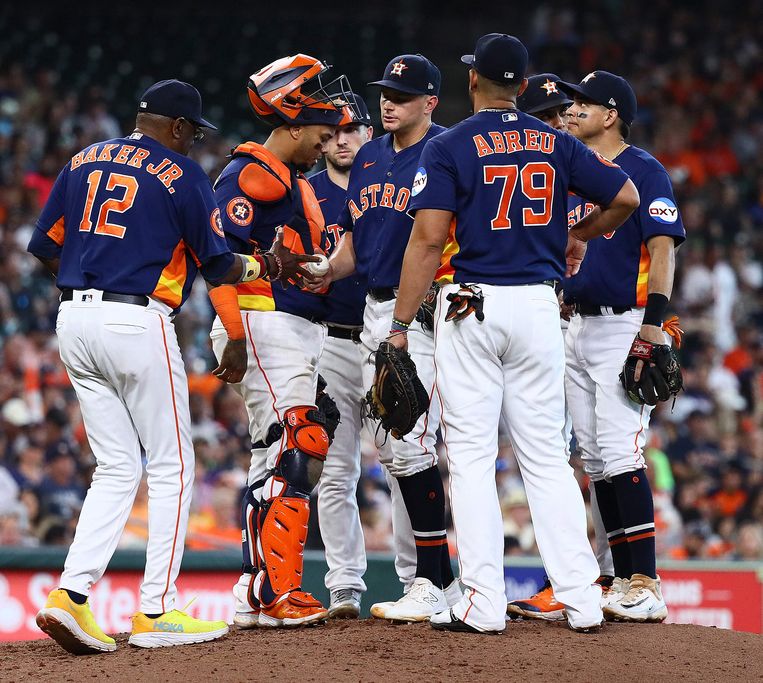
Why are there so few black baseball players in the United States?
The number of black players from their country has continued to decline in American baseball in recent years. This season I’ve hit a low point. The hope for a turnaround lies in a new generation, as is the case with the annual draft that began last weekend in Seattle.
The statistic in last year’s final between the Houston Astros and Philadelphia Phillies was staggering: for the first time since 1950, there were no black Americans in the final game. “This looks bad,” said Houston coach Dusty Baker, one of the only black coaches in the Major League. “This is not something we can be proud of as a sport.”
At the beginning of the current season, now halfway through, a new alarming observation followed: Only 6.2% of major league baseball players are black and American-born. The share was the lowest since 1991 when the University of Central Florida began recording players’ backgrounds.
an example
In the 1980s and early 1990s, black Americans still accounted for nearly a quarter of the players in the major league. Stars like Reggie Jackson and Ken Griffey Jr. They were the standard bearers of the competition. Baseball was a popular sport in America’s inner cities, but in recent decades contact between Major League and the black population in the United States has diminished. Basketball and American football are becoming a more attractive alternative for young people. It is easier to get scholarships with these two sports. The percentage of black college baseball players is even lower than among the professionals.
The lack of new icons could have hindered participation among young black Americans. For the major league leadership, which is concerned about the situation, the status of superstar Aaron Judge comes as a perfect opportunity. The New York Yankees’ majestic home run king was named the Most Valuable Player in his league last year.

Another explanation: Perhaps baseball is no longer of interest to black youth, just as the sport is in danger of losing interest among young Americans in general. This season, the major league made games shorter. The old unwritten rules about celebrating a home run with enthusiasm or challenging opponents have already been relaxed. Sports have to be great again.
Earlier this season, the MLB proudly presented numbers on diversity in the league. According to the league, 40 percent of baseball players come from “diverse” backgrounds. By far the largest share, about 30%, comes from Latin America. The decline in the number of black American players was accompanied by a sharp increase in the number of baseball players from countries such as the Dominican Republic and Puerto Rico. They are popular with American clubs because they are not recruited through the draft, the annual selection round for new talent, but can be signed as players without transfers. So the contracts are cheaper.
Young, black and American baseball players have fallen out of the picture among professional club scouts in recent decades because the sport has become more expensive at the youth level. Parents have to pay hundreds of dollars for equipment, training and especially travel reimbursements. He. She Travel ball In which many young baseball players participate, it is aimed primarily at affluent families, a group in which black Americans are still underrepresented. “Inner-city kids are being left behind because of the high prices,” Milwaukee Brewers manager Devin Williams said. USA Today. “And there are actually very few who play baseball.”
Dream series
The major league has taken action in recent years to turn things around. Training camps for underprivileged children were established across the country. The Dream Series in particular, named after Martin Luther King’s famous speech, seems to be coming to fruition.
A cautious shift appears imminent. The list of the top 100 talents compiled by experts includes the names of many black American baseball players. In last year’s draft, nine black Americans were among the first thirty players selected. According to experts, the growth in this year’s selection round, which began on Sunday and continues today, is also promising.

It remains to be seen whether the talent will actually make it to the major league. Only a small percentage of players who, as usual, start in development teams make it to the highest level. “The institution is there, but we still have a lot of work to do,” said Tony Riggins, a former player responsible for scouting talented black baseball players on behalf of the major league. “We need to be patient.”
The lack of black players is felt more and more every year on April 15, the day Jackie Robinson is honored in the American League. At the end of the nineteenth century, black players were banned from participating in the professional league. With Robinson’s debut in 1947 with the Brooklyn Dodgers, segregation in American baseball ended. The star player opened the gate for many others.
CC Sabathia of The Players Alliance, a group of former pros who want to get blacks playing baseball again, said the current small number of black players in the major league is discouraging. “Progress has been made. I don’t see the light at the end of the tunnel yet, but I notice now that there is a lot of digging going on.”

“Professional reader. Award-winning gamer. Zombie buff. Social media junkie. Bacon maven. Web scholar.”
